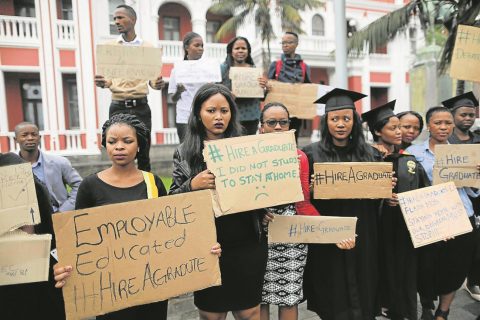African Leader
Transformation in Mining
More often than not when we talk of transformation we seem to think it only refers to issues of skin colour. Transformation is multi-faceted, yes we cannot run away from the skin colour debate, it will always be there whether we like it or not.
However, we have gender dynamics that also have to be put forth for discussion because they have a lot to do with what some would refer to as being natural, that a woman belongs in the kitchen, taking care of things at home. We then have age and youthfulness that can also be used to discriminate against the youth when it comes to experience that is linked to career progression.
Religion is another means and ways used by people to advance hate and intolerance against the others and whether we agree or not this does find its way into the workplace. Disability and HIV on the other hand are also viewed as incapability that has to be done away with in the workplace. These are all stereotypes that are communicated in subtle or blatant manners in our day to day lives, the prejudices we have to deal with in the workplace and as much as they don’t get infused into the policies guiding the way companies operate, they still find a way to be practiced within companies. They get subtly communicated in non-verbal cues and actioned in the corners. Practicing discrimination in one’s personal space is cruel and should not be happening and it takes a very strict society to take action against those that do. It becomes even worse when it is practiced in the workplace as it does occur regardless of laws and regulations put in place to curb such.
The Department of labour states that Employers must remove unfair discrimination from all their policies and practices, based on Legislation in Section 5, of the Employment Equity Act. A simple definition to discrimination would be:
Discrimination is hurtful treatment toward a person or a group of people due to them being a part of a certain group. Regulations are in place to prevent discrimination at work, however, many people still find themselves being discriminated against every day. Recognizing the types of workplace discrimination can enable companies to identify discrimination and to take steps towards transformation, not because it is a quota issue but as a prerequisite to growth and a show of respect for individuals.
Lack of transformation in any space, leads to inequality. Those that are viewed as being of lesser stature in society or workplace get discriminated against, hence it becomes a legislative matter for workplaces to transform.
According to an article written by the Government Communications and Information Systems (GCIS) – Transforming South Africa’s workplace, The Broad Based Black Economic Empowerment Act, Skills Development Act, Promotion of Equality and the Prevention of Unfair Discrimination Act, and the Employment Equity Act are legislations endorsed by the government to reverse the legacy of discrimination and inequality. Employment equity is not only a moral and human rights imperative; it is critical for the achievement of sustainable development, economic growth and equality.
Transformation in the mining industry
For the mining industry transformation is not only for regulation purposes, it is a business requirement that the industry needs to adhere to for it to operate seamlessly. Mining has not only been viewed as a sexist industry in the past but it was one of the vehicles used to entrench divisions amongst people, the industry itself became the complete example of discrimination in South Africa. That makes the transformation journey a bit more intense for the industry, especially with the broader South African society still being on the same journey itself.
The Mining Charter however, is the policy put in place as the wheels of transformation in the South African mining sector (Department of Mineral Resources, 2010). Transformation has become one of the priorities for the industry but the results are not showing any signs of progress in terms of change. This could be due to the fact that the government legislations can be hard on the sector, but individual companies still have their own policies while some actions taken do not get recorded anywhere. As one of the primary employers in the country and a historically discriminatory employer, the sector needs to play a big role in the paradigm shift. Mining contributes largely as a buyer because of the large quantities they buy for production, also they supply raw materials such as iron ore and platinum to other sectors, which contributes a lot in the South African economy. This on its own should drive the industry to transform and to becoming inclusive when dealing with suppliers, especially those from previously disadvantaged backgrounds.
Leveling the playground
Women leaders are needed in mining as one of the priority sectors of the South African economy. Gender transformation should not only be about meeting quotas but the future of the country. While talking safety at the mine, one of the female engineers at our currently being built mine once said, “If the mine could be built to be safer for women, it would be safer for everyone.” This would not mean mining has become womanly compared to what it represents (a man’s world), it would simply mean, the industry is growing and evolving into a better place for all. Transforming mining to be more receptive of women would not only benefit the female gender, but it would benefit the company and on a broader scale, the economy of South Africa. This would go a long way for the mining sector, considering the government legislation framework guiding the industry.
When people get discriminated against due to disability or their HIV status, this spells out just how heartless we can be as humans. Being a transformed and more encompassing industry does not mean we would lose our identity, it simply means we would be respecting people’s human rights and getting recognised as proponents of human dignity which could rewrite the history of the sector.
Getting discriminated against because of age and lack of experience is a frustration for the youth of South Africa. They are meant to be the ones taking the reins in the running of the country and therefore need to be recognised for the innovative role they can play to take the country forward. When they are not given an opportunity to put their ideas forth how would they learn to lead? The mining industry does not embrace change and inclusion of those they viewed as outsiders in the past. If this is to change, it has to start with the youth that comes from institutions of higher learning, male and female. They need to be afforded opportunities and those who have more experience than them should impart knowledge and skill so they can grow and take the industry to greater heights.
The issue of transformation is linked to human rights and human dignity. Individuals thrive on recognition and the realisation that they make a contribution towards a better society. The workplace is one of the places where that contribution starts. When people feel less of who they are meant to be because of the way they are made to feel about themselves, there becomes a huge gap of inequality. Everyone needs to be given an opportunity to make a contribution in building our companies in the way they know best, regardless of who they are and their background. In fact it should be a priority to level the playground for the previously disadvantaged persons to catch up for equality to be achieved both in the workplace and in the society.






 Sign-up and receive the Business Media MAGS newsletter OR SA Mining newsletter straight to your inbox.
Sign-up and receive the Business Media MAGS newsletter OR SA Mining newsletter straight to your inbox.